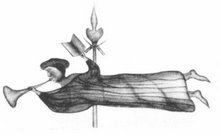The “What’s this world coming to when a jazz musician can be made a bishop?” svithe
.
. . . many in the community and even at the university
still dismissed jazz as, at best, an unsophisticated
art form and, at worst, an immoral and evil influence.
“Jazz has long been associated with evil environments and
evil lifestyles,” says Smith. But he has a different take . . . .
It has been a struggle, at times, to convince others. Smith
recalls a conversation between two BYU students after he
received a new church calling: “What’s this world coming
to when a jazz musician can be made a bishop?” But Smith
believes the Spirit can be conveyed through the toe-tapping
music. “In graduate school, I’d be sitting in the middle of
a jazz class, and I’d feel the burning of the Spirit so
powerfully and it would puzzle me,” Smith recalls. He later
found quotes by Brigham Young about the duty of the elders
of the Church to gather truth from whatever source and bring
it back to Zion. “I felt I had that mission to a certain
extent—to bring to Zion the wonderful aspects of jazz and
practice them in a wholesome lifestyle.”
. . . . “Ray has a profound faith, and he’s really a model
Christian . . . . He is able to very convincingly show that
the music’s got nothing to do with an unseemly lifestyle,
that the music stems from Heavenly Father, a manifestation of
all things good on the earth—passion and joy and power and
romance and heartbreak.”
The ward I grew up in just changed bishops and rumor has it our ward is about to undergo a change in leadership as well. The bishop in my parents' ward was called while we lived in the ward and I was in a position to watch him closely as he took on that mantle. He was a great example to me and his release makes me consider what I've done with my life since that time.
I think this is a true principle: Live worthy to be called to X position. Not because you will be called or you aspire to be called, but because if the Lord did call you, wouldn't you like to be ready?
(Sorry for the second person. As always, I'm just talking about myself.)
The article quoted above, which I only recently read, brought this to mind again. Here in Berkeley I can't imagine that what's-the-world-coming-to problem (yay, berkeley!), but I can imagine someone in a crazyheaded profession like jazz (or fiction) being the recipient of leery gazes in wards here and there.
Orson Scott Card has written about the responsibility of Mormon artists to try and fit in. And this is
where I'm heading today: the need to be part of the community. Not necessarily for the individual's sake, but for the
community's sake.
This is part of building Zion: being willing to sacrifice what we selfishly view as our "identity" in order to serve and be served.
It's not just jazz musicians and semen svithers who can come off strange,
everyone is weird--just some people live lives that don't emphasize that fact so much. But if we cherish our weirdness more than gospel, we will never arrive at the feet of Christ.
This is a lesson I'm constantly trying to teach myself. Believe me, I find it very easy to be peculiar. But I'm still capable of minimizing
that peculiarity to be part of
the peculiar people. Which is where I want to be.
Because I believe in Jesus Christ. And I believe he's anxious to redeem me from my sins. And that's a heckuvalot more important than being outrageous.
The good news is the two aren't mutually exclusive.
Winkwink.
this svithe on thmusings
last week's svithe
 .
.

